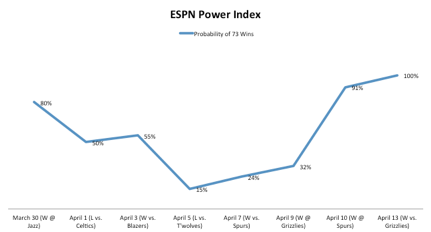ESPN’s Power Index projections have gone from annoying to insufferable after repeatedly being shoved down our collective throats for the last eight months.
I have no problem with ESPN’s increased emphasis on statistics and analytics over the last couple years; they’ve become an increasingly important and popular part of sports since the “Moneyball” revolution. Nate Silver, the editor-in-chief of ESPN’s FiveThirtyEight blog and resident numbers czar, has certainly proven himself to be an extraordinary statistician with his record of success projecting election results.
And the Power Index by itself is a helpful way to compare teams beyond win-loss records—especially when said teams are in different divisions or conferences.
But there are three main problems I see with these ever-prominent win projections:
#1: They Aren’t Insightful
We all learned the formula for probability in grade school:
Probability = Favorable outcomes / Total possible outcomes
Probabilities give us great insight when used in the correct context, such as the chance for each non-playoff team to win the NBA draft lottery or the probability a player will win a poker hand after each card is dealt. That’s because, in each case, there are a set number of outcomes and each one is likely to occur.
Games don’t work like that.
So instead, ESPN uses its Power Index based on a number of different stats to simulate games and come up with a subjective probability that each team will win.
But here’s the rub; with the help of win-loss records, public opinion, polls when applicable and the spread, we already know who the favorite is and whether they are expected to win by a little, a lot or somewhere in between.
I don’t need a Power Index to give me an exact number of each team’s projected probability that is subjective and feels like the creation of a random number generator.
Now if the Power Index predictions could reliably and consistently predict the probability teams beat the spread, that would be insightful—and Nate Silver would be richer than Biff Tannen.
#2: More Reactive Than Predictive
I’m OK with championship predictions at the beginning of the regular season or the postseason. But it drives me crazy when the Power Index makes continual predictions about the same event—such as the Warriors’ chase for 73 wins or the likelihood of winning an NBA playoff series—after every… single… game.
Just make one set of predictions and stick with it.
Updating a series prediction after every game is like tearing up your NCAA tournament bracket after each round and filling out a new one.
Take a look at how the Warriors’ probability of setting the NBA record for wins yo-yoed over the final two weeks of the NBA season, according to the BPI.
I’m sure Nate Silver would say the Power Index wasn’t wrong, it just showed how statistically improbable the Warriors winning 73 games was after they lost to the Timberwolves on April 5th.
I say, “Stop the madness.”
#3: Sports Projections Even Make Computers Look Silly
Let’s take a look back at 2016 so far.
First we were told that No. 4 Oklahoma, not No. 1 Alabama, had the best chance to win the College Football Playoff. Why? “Because the Sooners have the highest FPI rating (the metric we use to calculate win probabilities for the playoff games) in FBS football.” Um, OK. So you’re justifying one statistic with another mystery statistic? Got it. The FPI—whatever that is—didn’t look so good when Clemson ran the Sooners off the field in the second half of the Orange Bowl.

Then came the NFL playoffs.
The FPI liked the Cardinals, not the top-seeded Panthers or Broncos, to hoist the Vince Lombardi Trophy with a 29.4% chance of winning Super Bowl 50 compared to Denver’s 10.7% despite the Cardinals losing by 30 to Seattle in Week 17. We were told “that is one game in a 16-game sample.” Apparently Carson Palmer’s playoff ineptitude wasn’t factored into the Power Index because the Cards lost to Carolina by 34 points in the NFC Championship Game.
I hope you didn’t use the Power Index to fill out your NCAA tournament bracket; none of the Power Index’s top three favorites to cut down the nets in Houston, Kansas, Virginia and Michigan State—even made it to the Final Four (in fairness, the BPI’s fourth-favorite team, Villanova, did win it all).

And finally, there’s the NBA playoffs.
We were told by the BPI that there was an 78.6% chance of either the Warriors or Spurs winning the NBA Finals. And that the Spurs had an 84% of advancing to the Western Conference Finals after beating the Thunder in Game 1. And that the Warriors had a 71% chance of beating the Thunder before their current series started.

Maybe it’s just an unlucky run for the Power Index and its postseason projections will prove prescient over the course of time and a bigger sample size.
But I doubt it. What makes sports so great is that they are so unpredictable and often defy all logic and probabilities—whether it’s Texas A&M rallying from 12 points down in the final 44 seconds of an NCAA tournament game or a team with the best regular season record in NBA history not even making it to the NBA Finals.
As the saying goes, “That’s why they play the game.”
You just wouldn’t think you’d have to tell “The Worldwide Leader in Sports” that.










Comments are closed.